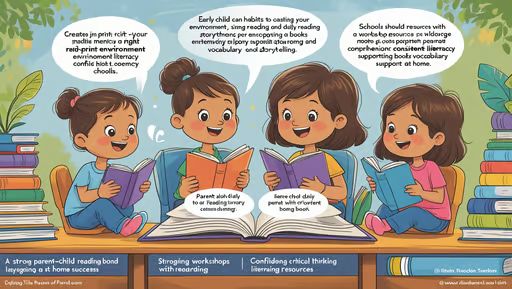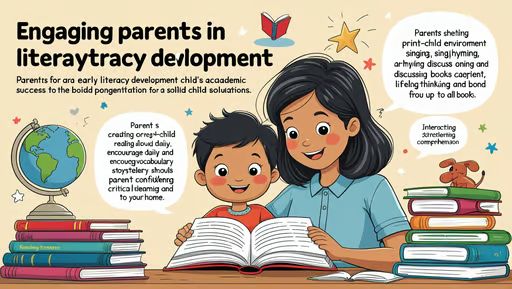Engaging Parents in Early Literacy Development, Early literacy development is a critical foundation for a child’s academic success and lifelong learning. Research consistently shows that children who are exposed to reading and language-rich environments from an early age are more likely to develop strong literacy skills. While educators play a significant role in fostering these skills, parents are equally, if not more, influential in shaping their child’s early literacy journey. Engaging parents in early literacy development is essential to ensure that children receive consistent support both at home and in educational settings. This article explores the importance of parental involvement, strategies to engage parents, and the long-term benefits of collaborative efforts in early literacy development.
The Importance of Parental Involvement in Early Literacy
Parents are a child’s first teachers, and their involvement in early literacy development can have a profound impact on a child’s language acquisition, reading readiness, and overall cognitive development. From birth, children begin to absorb language and communication patterns from their caregivers. Simple activities like talking, singing, and reading to infants and toddlers help build their vocabulary, listening skills, and understanding of language structures. These early interactions lay the groundwork for later reading and writing skills.
When parents actively participate in their child’s literacy development, they create a nurturing environment that encourages curiosity and a love for learning. Children who grow up in homes where reading is valued are more likely to view books and learning as enjoyable activities. Moreover, parental involvement helps bridge the gap between home and school, ensuring that children receive consistent messages about the importance of literacy. By working together, parents and educators can create a seamless learning experience that supports the child’s development.
Strategies to Engage Parents in Early Literacy
Engaging parents in early literacy development requires a collaborative and supportive approach. Educators and community organizations can play a pivotal role in equipping parents with the tools and knowledge they need to support their child’s learning. Here are some effective strategies to involve parents in early literacy:
- Provide Resources and Guidance: Many parents may not know where to start when it comes to fostering early literacy. Schools and community centers can offer workshops, handouts, and online resources that provide practical tips for reading aloud, creating a print-rich environment, and incorporating literacy into daily routines. For example, parents can be encouraged to label household items, read street signs, and discuss stories during mealtime.
- Promote Shared Reading: Shared reading is one of the most effective ways to develop early literacy skills. Parents can be encouraged to read with their children daily, asking open-ended questions and discussing the story to enhance comprehension and critical thinking. Providing parents with age-appropriate book recommendations and access to libraries can further support this practice.
Strategies to Engage Parents in Early Literacy
- Model Positive Literacy Behaviors: Children often imitate the behaviors of their parents. When parents demonstrate a love for reading and writing, children are more likely to adopt similar attitudes. Encouraging parents to set aside time for family reading or to share their favorite books with their children can foster a positive literacy culture at home.
- Create Literacy-Rich Environments: A home environment filled with books, writing materials, and educational games can significantly boost a child’s literacy development. Parents can be guided on how to create a dedicated reading corner, stock up on diverse books, and use everyday materials like newspapers and magazines to engage their child in literacy activities.
- Leverage Technology: In today’s digital age, technology can be a valuable tool for early literacy. Parents can use educational apps, e-books, and online storytelling platforms to supplement traditional reading practices. Educators can recommend high-quality digital resources and provide guidance on balancing screen time with other literacy activities.
- Foster Two-Way Communication: Building strong partnerships between parents and educators is key to supporting early literacy. Regular communication through parent-teacher meetings, newsletters, and digital platforms can keep parents informed about their child’s progress and provide opportunities for feedback and collaboration.

The Role of Schools and Communities
Schools and communities play a crucial role in engaging parents in early literacy development. By creating inclusive and accessible programs, they can empower parents to take an active role in their child’s education. For instance, family literacy nights, where parents and children participate in reading activities together, can strengthen bonds and reinforce the importance of literacy. Additionally, community libraries and literacy organizations can offer free workshops, book clubs, and storytelling sessions that involve both parents and children.
It is also important to recognize and address barriers that may prevent parents from participating in early literacy initiatives. Factors such as language differences, cultural beliefs, and socioeconomic challenges can impact a parent’s ability to engage. Schools and communities can adopt culturally responsive practices, provide translation services, and offer flexible scheduling to ensure that all families have the opportunity to participate.
The Long-Term Benefits of Parental Engagement
The benefits of engaging parents in early literacy development extend far beyond the early years. Children who receive consistent literacy support at home are more likely to perform well academically, develop strong communication skills, and exhibit a lifelong love for learning. Moreover, parental involvement fosters a sense of confidence and motivation in children, encouraging them to take ownership of their learning journey.
For parents, participating in their child’s literacy development can strengthen family bonds and provide a deeper understanding of their child’s strengths and needs. It also empowers parents to become advocates for their child’s education, ensuring that they remain actively involved throughout their schooling.
Overcoming Challenges and Building Partnerships
While the benefits of parental engagement are clear, it is important to acknowledge the challenges that may arise. Some parents may feel overwhelmed or unsure of how to support their child’s literacy development, while others may face time constraints due to work or other responsibilities. To address these challenges, schools and communities must adopt a flexible and empathetic approach. Offering evening or weekend workshops, providing take-home literacy kits, and creating online support groups can make it easier for parents to participate.
Building strong partnerships between parents, educators, and community members is essential for creating a supportive ecosystem for early literacy development. By working together, stakeholders can share resources, exchange ideas, and develop innovative strategies to engage families. Ultimately, these collaborative efforts can help ensure that every child has the opportunity to develop the literacy skills they need to succeed in school and beyond.
Conclusion
Engaging parents in early literacy development is a powerful way to set children on the path to academic success and lifelong learning. By providing parents with the tools, resources, and support they need, educators and communities can create a strong foundation for literacy that extends beyond the classroom. Through shared reading, literacy-rich environments, and open communication, parents can play an active role in nurturing their child’s love for language and learning. As we continue to recognize the importance of early literacy, it is essential to prioritize parental involvement and build partnerships that empower families to support their children’s educational journey. Together, we can ensure that every child has the opportunity to thrive and reach their full potential.

7 thoughts on “Engaging Parents in Early Literacy Development”
Comments are closed.